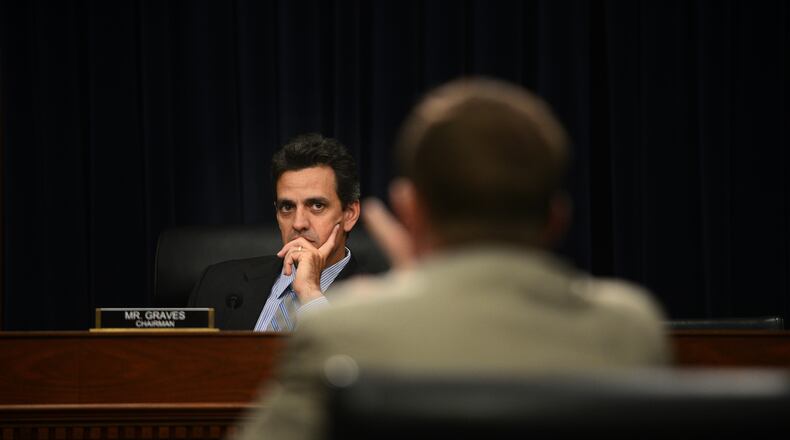Georgia Republicans on Tuesday sounded cautious notes about an emerging agreement that would set aside new money for barriers on the southern border but provide billions less than what President Donald Trump had been seeking for a wall.
Congressman Tom Graves, R-Ranger, the only Georgia member of the bipartisan negotiating committee, indicated he had major reservations about the border security deal, which was announced late Monday. His concerns were echoed by at least one of his colleagues from the state.
“I haven’t signed off on the reported ‘deal’ nor have I seen it. Based on the reports, I have concerns,” Graves tweeted early Tuesday. “Lots of questions too.”
Republican leaders offered early praise of the hard-fought agreement, which would set aside nearly $1.4 billion to build 55 miles of new barriers and stave off a second government shutdown this year. But critical comments from Trump created a major uncertainty surrounding the compromise on Tuesday afternoon, even as he stopped short of a veto threat.
“I am extremely unhappy with what the Democrats have given us,” Trump said ahead of a Cabinet meeting. He said he’s “adding things” to the compromise and that he “would hope” there would not be another shutdown showdown over the weekend.
Trump had initially requested $5.7 billion for more than 200 miles of new barriers along the southern border.
Current funding for nine Cabinet-level departments expires on Friday evening.
Earlier in the day, Georgia U.S. Sen. David Perdue indicated he would wait to hear from Trump before announcing his position on the deal. But he offered some initial praise less than 24 hours after he returned from a trip to the southern border with colleague Steve Daines of Montana.
"It's a start," the first-term Republican told the Atlanta Journal-Constitution and WSB-TV in a joint interview. "Right now, any type of support from a funding standpoint that will move us past this impasse I think is going to be received positively. The president's pretty much said that.”
During the shutdown, Perdue had urged his close ally to hold strong for border money and policy changes that would close what he saw as loopholes in immigration law. The new border deal would not alter immigration statutes, according to media reports.
Amanda Maddox, a spokeswoman for U.S. Sen. Johnny Isakson, said the Republican was “inclined to support” the deal but was waiting to see details before making a final decision.
Most local Democrats remained hush-hush about the proposal but were seen as likely to ultimately support it.
Text of the deal was expected to be released on Wednesday.
Several conservative groups slammed the agreement as insufficient, and at least one Georgia Republican indicated he was likely to reject it.
“Still waiting on final text, but based on reports, this tentative 'deal' leaves a lot to be desired to secure the border," tweeted U.S. Rep. Jody Hice, R-Monroe, a member of the House Freedom Caucus. He said he was “glad” Trump had other executive actions “in his arsenal to #BuildTheWall.”
Trump continued to defend his ability to declare a national emergency to secure border money on Tuesday, and advisers floated the prospect of him diverting some military construction funding even without an emergency designation.
Perdue, who previously backed Trump up on emergency declarations, said he hoped the course of action was an “unnecessary hypothetical.”
"I think we're at a point now where both sides can say 'look, we didn't get everything we wanted, but we got a deal, we got a compromise here,'” he said. “That's what America wants."
Wall funding was not the only issue that prompted criticism from local legislators. Maddox said Isakson was disappointed by initial reporting that the agreement did not include emergency money for victims of recent natural disasters, a major priority of the Georgia delegation after Hurricane Michael.
The Associated Press contributed to this article.
About the Author
Keep Reading
The Latest
Featured



